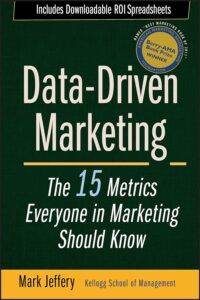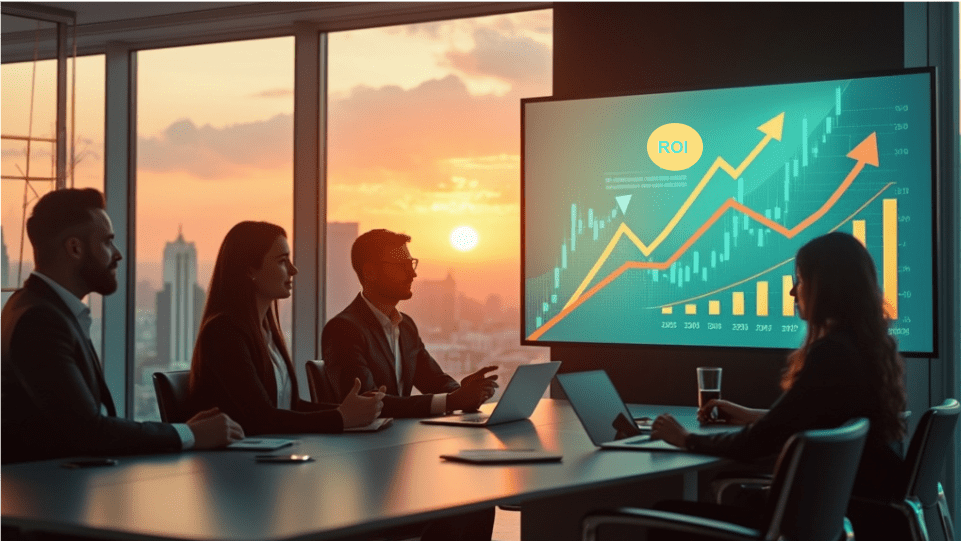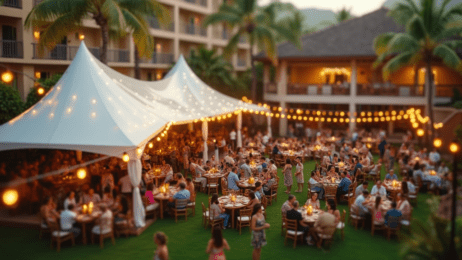Hotel sales directors face increasing pressure to demonstrate measurable returns on their marketing investments, particularly in the meetings and events sector. With tightened budgets and heightened expectations, the ability to maximize Return on Investment (ROI) is a strategic imperative that can differentiate successful hotels from their competitors.
This article explores proven strategies for hotel sales directors to enhance their meeting and event marketing ROI. From leveraging data analytics to embracing personalization, sustainability, and optimized campaign techniques, these approaches will help you capture more business while demonstrating clear value to stakeholders.
Sign up for the monthly Behind the Bookings newsletter here
The Importance of Data in Event Marketing
When you track ROI, you can see which marketing efforts are working and which ones aren’t. This helps hotel sales directors prove that marketing is worth the money, and it helps them use data to make smarter choices. Some of the tools that can help with ROI tracking are CRM systems, attribution models, and analytics platforms.
Why ROI Measurement Matters
The meetings and events segment can represent 30-60% of a hotel’s total revenue, yet many properties still rely on outdated methods to track performance. Without proper measurement, it’s impossible to determine which marketing efforts drive bookings and which merely consume resources.
ROI measurement enables sales directors to:
- Justify marketing expenditures to ownership and management
- Allocate resources to the most effective channels
- Identify underperforming initiatives before they drain budgets
- Make data-backed decisions rather than relying on intuition
Key Tools for ROI Tracking
Effective ROI measurement requires the right tools. Consider implementing:
- Customer Relationship Management (CRM) Systems: Modern CRM platforms like Salesforce or HubSpot allow you to track the entire customer journey, from initial inquiry to final booking and post-event feedback.
- Attribution Models: Multi-touch attribution helps identify which touchpoints influenced booking decisions, allowing for more accurate ROI calculations across complex marketing campaigns.
- Analytics Platforms: Tools like Google Analytics 4 provide insights into website visitor behavior, conversion paths, and campaign performance.
- Marketing Automation Software: Platforms like Marketo or Pardot can track email engagement, content downloads, and other digital interactions that precede bookings.
- Post-Event Surveys: Structured feedback collection helps quantify the intangible aspects of ROI, including client satisfaction and likelihood of rebooking.
Building a Data-Driven Culture
Technology alone won’t transform ROI; you need organizational buy-in. To foster a data-driven culture:
- Establish clear KPIs that align with business objectives
- Train your team on data collection and interpretation
- Create regular reporting cadences to review performance
- Celebrate data-driven successes to reinforce positive behaviors
- Use insights to continuously refine your marketing approach
The most successful hotel sales teams make data analysis a daily habit rather than a quarterly exercise.

Personalization: Delivering Exceptional Experiences
Personalization will help you get more bookings. You need to make sure that each person feels like you know what they need and want. Research shows that people are more likely to open and click on personalized emails and messages.
Why Personalization Drives Results
Meeting planners and corporate event organizers face tremendous pressure to create memorable experiences. Generic proposals no longer suffice in this environment. Research over the past 10 years from various groups show that personalized marketing communications receive higher open rates and higher click-through rates than generic messages.
Personalization drives ROI by:
- Demonstrating your understanding of client needs
- Differentiating your property from competitors
- Building stronger emotional connections with prospects
- Increasing conversion rates at every stage of the sales funnel
- Fostering loyalty that leads to repeat business
How Hotels Can Personalize at Scale
While personalization sounds labor-intensive, modern tools make it achievable even with limited resources:
- Segment Your Database: Categorize clients by industry, event type, budget range, and past booking behavior to deliver targeted communications.
- Create Industry-Specific Content: Develop proposal templates, case studies, and marketing materials tailored to key verticals like pharmaceutical, technology, or financial services.
- Leverage Dynamic Content: Use email marketing platforms that automatically customize content based on recipient attributes and behaviors.
- Personalize Site Inspections: Move beyond the standard property tour by showcasing spaces configured specifically for the client’s event type.
- Utilize Video Personalization: Create custom video messages for high-value prospects that address their specific needs and demonstrate your attention to detail.
There are several personalized proposal systems available that hotels can utilize to enhance their sales processes and improve client engagement. These systems enable hotels to create customized, visually appealing proposals tailored to individual client needs. Here are some notable options:
- Cendyn: Offers a platform that allows hotels to tailor each sales proposal based on the recipient, incorporating native language and compelling video content to stand out from competitors.
- Cvent: Provides a custom proposal tool designed to help hotels differentiate their property with unique branding and engaging content, including images and videos.
- Q9 Digital: Specializes in simplifying group sales for luxury, resort, and convention hotels by managing proposals, presentations, floor plans, catering menus, and RFPs.
- ProposalPath by SalesAndCatering.com: Enables hotels to quickly select the right content, photos, and sales collateral, transforming them into winning presentations.
- MICE Operations: Offers powerful quotation software that allows hotels to create beautiful, personalized proposals matching their own identity and style.
- Tripleseat: Provides an all-in-one software solution to streamline the booking and planning processes, enhancing productivity and boosting event revenue.
- SendSites: Allows hotels to quickly customize unique and high-quality proposals for clients, delivering exactly what they need.
Implementing such systems can significantly enhance a hotel’s ability to respond to client inquiries with personalized, professional proposals, thereby increasing the likelihood of securing bookings and improving overall client satisfaction.
Sustainability as a Value Proposition
Meeting planners view sustainability as a primary factor when planning events. Companies are demanding it, and younger people really do care about the environment. Hotels can use this to their advantage to bring in new customers.
Why Sustainability Matters in Meeting & Event Marketing
Sustainability has evolved from a nice-to-have feature to a critical decision factor for many organizations. According to a 2022 report by American Express Meetings & Events, 80% of event planners consider sustainability in their planning processes. Additionally, a September 2024 survey revealed that 60% of event professionals include sustainability criteria in their request for proposals (RFPs) for venues. These findings underscore the growing emphasis on environmental considerations in venue selection and event planning within the industry.
This shift represents both an opportunity and a challenge for hotel sales directors:
- Many corporations have established sustainability mandates for their events
- Younger generations of decision-makers prioritize environmental responsibility
- Sustainable practices can create cost savings that benefit both hotels and clients
Genuine sustainability initiatives provide compelling content for marketing campaigns
Tips for Incorporating Sustainability
To effectively leverage sustainability in your marketing:
- Document Your Green Initiatives: Create comprehensive materials outlining your property’s sustainable practices, from energy efficiency to waste reduction.
- Obtain Certifications: Pursue recognized sustainability certifications like LEED, Green Key, or EarthCheck to provide third-party validation.
- Create Sustainable Meeting Packages: Develop turnkey solutions that bundle eco-friendly practices like paperless registration, plant-based menu options, and carbon offset programs.
- Quantify Environmental Impact: Provide post-event reports that calculate the reduced carbon footprint resulting from sustainable choices.
- Highlight Local Connections: Showcase partnerships with local, sustainable vendors and community initiatives that enhance your property’s environmental story.
The Javits Center in New York City effectively markets its 7-acre green roof and other sustainability features, which has helped increase event bookings by organizations with strong environmental commitments.
Optimizing Marketing Campaigns for More Bookings
Hybrid events, repurposed content, and strategic retargeting are transforming how hotels engage with clients and drive revenue. This section explores how innovative approaches—such as virtual site tours, content recycling, and targeted marketing campaigns—can maximize conversions and enhance return on investment in the hospitality industry. Learn from real-world success stories that showcase the power of these strategies in action.
Leveraging Hybrid Events to Reach More Clients
The pandemic accelerated the adoption of hybrid events, creating new marketing opportunities for hotels. By embracing this model:
- Host virtual site tours for planners unable to travel
- Create hybrid showcase events that demonstrate your property’s capabilities
- Develop content from in-person events that can be repurposed for digital audiences
- Partner with technology providers to position your property as hybrid-ready
- Use virtual events as lead generation tools for future in-person bookings
Here are examples of hotels seeing increased conversions after implementing virtual tours:
- The Radisson Hotel chain saw a “135% increase in online revenue amounting to $7,200 per hotel per month over those without a virtual tour” after introducing virtual tours.
- An upscale hotel in downtown San Diego reported: “During a site visit, one of our meeting spaces was unavailable for viewing. However, we utilized our TrueTour to walk the client to the meeting floor and virtually showcase the space. Thanks to that immersive experience, we successfully closed a deal resulting in a total revenue of $20,000.”
- Radisson Hotel Group reported that their immersive experiences helped “boost conversions for its meetings and events business” with virtual tours generating “increased qualified meetings and events inquiries by 35% and booking conversions by 12%.”
These examples demonstrate that virtual reality tours can significantly increase site inspection conversions, overall booking rates, and revenue for hotels.
Repurposing Content to Maximize Marketing Impact
Content creation can be resource-intensive, making repurposing essential for ROI maximization:
- Transform Client Events into Case Studies: Document successful events and create multi-format case studies for different channels.
- Convert Webinar Content to Multiple Formats: Extract key insights from webinars to create blog posts, social media content, and email campaigns.
- Create Content Ecosystems: Build comprehensive content packages around core themes relevant to your target markets.
- Utilize User-Generated Content: Encourage clients to share their event experiences on social media with branded hashtags.
- Update Evergreen Content: Refresh successful past content with new data and insights rather than creating everything from scratch.
Retargeting Leads for Conversions
Not all prospects convert immediately. Effective retargeting strategies include:
- Implement Pixel-Based Retargeting: Use digital advertising platforms to reconnect with website visitors who didn’t complete inquiry forms.
- Create Segmented Retargeting Campaigns: Develop different messaging for prospects at various stages of the decision journey.
- Utilize Email Nurture Sequences: Build automated email campaigns that provide increasingly specific information based on prospect engagement.
- Leverage Remarketing Lists for Search Ads: Target past website visitors when they conduct related searches on Google.
- Deploy Cross-Platform Retargeting: Coordinate messaging across social media, display advertising, and email to create consistent experiences.
Contact Smart Meetings today to help you get started.
Here are some hotel retargeting success stories:
- Triptease’s retargeting solution for hotels reports “driving a return on investment almost double the industry average by taking a joined-up approach to the guest journey.”
- United Airlines used YouTube remarketing to reach people who had previously searched for flights, which led to an additional 17,000 booked flights and 52% of conversions attributed directly to YouTube ads.
- Le Parc Suite found that 94.5% of their website visitors abandoned after checking prices. They implemented reservation email retargeting and recovered tens of thousands in revenue, improving their return on ad spend by 1710%.
These sources confirm that strategic retargeting and segmented marketing approaches do significantly improve conversion rates in the hospitality industry.
Next Steps
As the meetings and events continue to evolve, hotel sales directors must embrace data-driven strategies that maximize marketing ROI. By implementing robust measurement systems, delivering personalized experiences, highlighting sustainability initiatives, and optimizing campaigns through hybrid approaches, content repurposing, and strategic retargeting, you can drive more bookings while demonstrating clear value to your stakeholders.
The most successful sales directors view ROI as a mindset that permeates every marketing decision. By consistently asking “how will this drive returns?” before allocating resources, you can create a more efficient, effective approach to meeting and event marketing that delivers measurable results in today’s competitive hospitality environment.
Remember that maximizing ROI is not about doing more with less—it’s about doing more of what works and less of what doesn’t. With the strategies outlined in this article, you’ll be well-positioned to make those critical distinctions and drive sustainable growth for your property’s meeting and event business.




